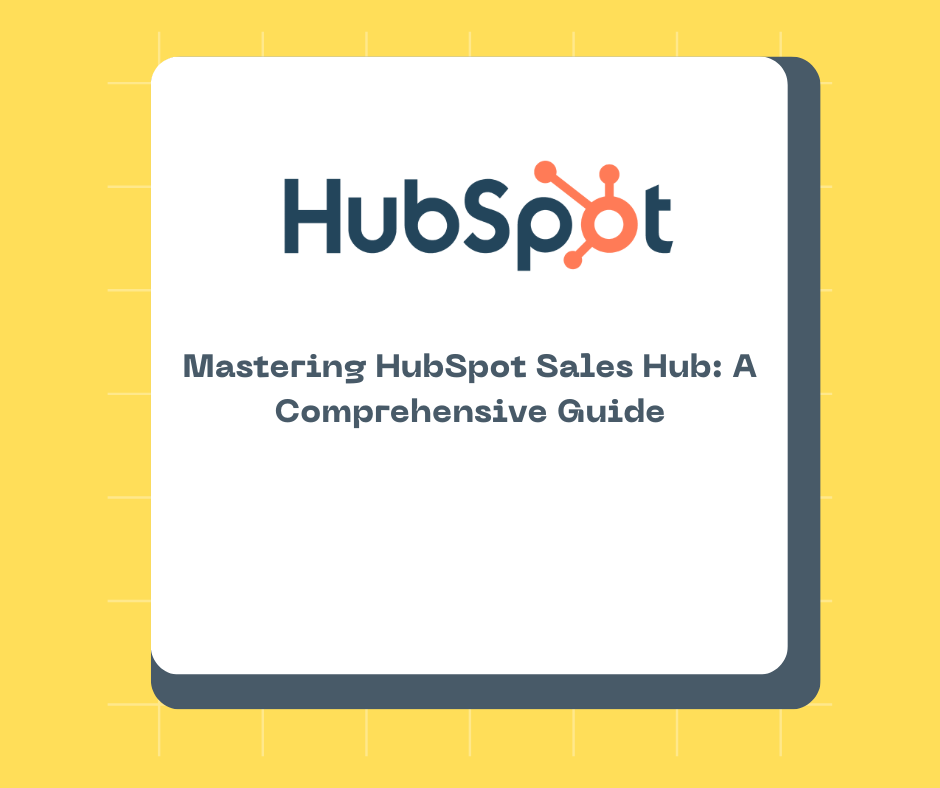In the fast-paced world of sales, having the right tools can make all the difference in closing deals and driving revenue. HubSpot Sales Hub stands out as a comprehensive solution designed to streamline sales processes, enhance productivity, and ultimately, help businesses grow. This guide delves into the features, benefits, and strategies for mastering HubSpot Sales Hub, providing sales professionals and teams with insights to fully leverage this powerful platform.
Introduction to HubSpot Sales Hub
HubSpot Sales Hub is part of HubSpot's broader CRM platform, specifically tailored to the needs of sales teams. It combines a range of features including email tracking, meeting scheduling, deal pipeline management, and performance analytics, all within a user-friendly interface. The platform's integration with marketing and service hubs ensures a seamless flow of information across departments, fostering collaboration and a unified approach to customer engagement.
Getting Started with HubSpot Sales Hub
The first step in mastering HubSpot Sales Hub is to set it up in alignment with your sales process. Customizing deal stages, setting up email templates, and integrating existing tools and platforms are crucial tasks. Ensuring your team is trained and comfortable with the basics of the platform will pave the way for a smoother adoption and more effective use.
Email Integration and Tracking
One of the standout features of HubSpot Sales Hub is its robust email integration and tracking capabilities. Connecting your email account allows for sending, receiving, and tracking emails directly within the platform. Real-time notifications when prospects open emails or click links provide invaluable insights, enabling sales reps to follow up with timely and relevant communication.
Meeting Scheduling Simplified
Scheduling meetings can often be a time-consuming task, involving back-and-forth emails to find a suitable time. HubSpot's meeting scheduler streamlines this process by allowing sales reps to share their availability via a personalized booking link. Prospects can then choose a time that works for them, reducing friction and speeding up the sales cycle.
Deal Pipeline Management
Visualizing and managing your deal pipeline is a core function of HubSpot Sales Hub. Customizable deal stages reflect your sales process, providing clarity on where each deal stands. This visibility helps sales teams prioritize efforts, forecast revenue more accurately, and identify bottlenecks in the sales process.
Automating Sales Activities
Automation is a key feature of HubSpot Sales Hub, designed to save time and reduce manual tasks. Workflows can automate follow-up emails, task assignments, and deal updates based on specific triggers. This not only ensures consistency in communication but also allows sales reps to focus on high-value activities.
Sales Playbooks and Training
Continual learning and adherence to best practices are essential for sales success. HubSpot Sales Hub's sales playbooks feature provides a centralized repository for sales strategies, templates, and guidelines. This ensures that all team members have access to the same information and can apply proven tactics in their interactions with prospects.
Analytics and Performance Tracking
Understanding what works and what doesn't is crucial in sales. HubSpot Sales Hub offers comprehensive analytics and reporting features that provide insights into individual and team performance, deal forecast, and sales activities. This data-driven approach allows for informed decision-making and strategic adjustments to improve sales outcomes.
Integrations and Ecosystem
The power of HubSpot Sales Hub is further enhanced by its extensive ecosystem of integrations. Whether it's connecting to a third-party email service, a calling tool, or leveraging the capabilities of other HubSpot Hubs, these integrations provide a seamless experience and extend the platform's functionality.
Best Practices for Leveraging HubSpot Sales Hub
To maximize the benefits of HubSpot Sales Hub, consider the following best practices:
- Regularly Review and Optimize Your Sales Process: Use the data and insights from HubSpot to continuously refine your sales stages, templates, and playbooks.
- Embrace Automation Strategically: Automate repetitive tasks but maintain a personal touch in key communications and interactions with prospects.
- Leverage Analytics for Continuous Improvement: Analyze performance data to identify trends, challenges, and opportunities for training or process adjustments.
- Foster a Culture of Collaboration: Encourage your sales, marketing, and service teams to work together within HubSpot to ensure a cohesive customer experience.
Conclusion
Mastering HubSpot Sales Hub is not just about understanding its features but about integrating it effectively into your sales strategy and processes. By leveraging its comprehensive set of tools, automating where possible, and continuously optimizing based on insights, sales teams can achieve higher efficiency, better engagement with prospects, and, ultimately, more closed deals. As the sales landscape evolves, HubSpot Sales Hub provides a robust foundation for teams to adapt, grow, and succeed in meeting their sales objectives.
Schedule your training session here and comment “Need Training” on the request form.

Comments